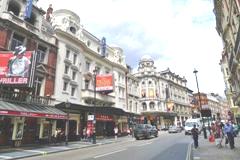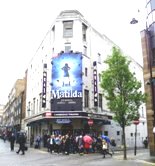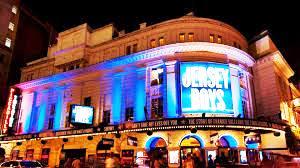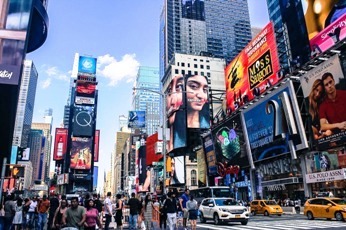|
Introduction
At any one moment, well over forty musicals are running on London stages, mainly in the West End. Even if your interests as a songwriter do not lie in the direction of the musical stage, seeing a live performance of one of the top shows is an experience no songwriter should miss.
Jim Liddane looks at the theatre scene in London and New York.
Musicals On Stage In London
  
Prologue
The West End is a world-renowned theatre district in London, England.
The origins of the West End as a theatre district can be traced back to the 17th century. During this time, theatres were primarily located outside the city walls of London due to restrictions imposed by the City of London Corporation. The most famous theatre of the era was the Theatre Royal, Drury Lane, which opened in 1663. Other theatres, such as the Theatre Royal, Covent Garden, also emerged in the vicinity.
In the 18th century, the West End began to flourish as a fashionable and vibrant entertainment district. The theatres attracted wealthy patrons, and the area became a hub for social gatherings and cultural events. The Georgian era witnessed the rise of notable playwrights like Richard Sheridan and Oliver Goldsmith, who produced popular plays performed in the West End.
The 19th century was a pivotal period for the West End. The construction of the Strand and Regent's Street, as well as the introduction of gas lighting, contributed to the district's development. The theatre Royal, Haymarket, and Her (now "His") Majesty's Theatre were established during this time, hosting plays, operas, and musical performances.
The Victorian era further solidified the West End's status as a theatrical powerhouse. It witnessed the growth of grand theatres like the Lyceum Theatre and the Criterion Theatre. The era also saw the emergence of popular musical hall entertainment, which eventually paved the way for the modern musical.
The 20th century brought significant changes to the West End. theatres like the London Palladium and the Prince of Wales Theatre gained prominence and attracted international stars. Notable playwrights, including Noλl Coward and George Bernard Shaw, showcased their works in the district. The West End also became a thriving centre for revues, comedies, and musicals, with iconic productions like "The Mousetrap" and "Les Misιrables" debuting during this period.
In recent decades, the West End has continued to evolve and adapt. It has seen the revitalisation of historic theatres, such as the Savoy Theatre and the Old Vic, and the construction of modern venues like the National Theatre. New and innovative productions, including "The Phantom of the Opera," "Matilda the Musical," and "Hamilton," have achieved great success and attracted international audiences.
Today, the West End remains a vibrant theatre district with over 40 venues showcasing a wide variety of performances, ranging from classic plays to groundbreaking musicals. It attracts millions of theatregoers annually, both locals and tourists.
The Main Venues
London's West End is home to numerous important and historic theatres, although not all of them necessarily stage musicals.
Theatre Royal, Drury Lane
Located on Catherine Street, Covent Garden, Theatre Royal, Drury Lane is one of the oldest and most prestigious theatres in London. It has a rich history dating back to the 17th century and has hosted legendary productions like "My Fair Lady" and "Oliver!"
His Majesty's Theatre
Situated on Haymarket Street, His Majesty's Theatre is a historic venue known for hosting long-running musicals. It is particularly famous for being the home of Andrew Lloyd Webber's "The Phantom of the Opera" since 1986.
The London Palladium
Found on Argyll Street, The London Palladium is a renowned theatre known for its variety shows, musicals, and pantomimes. It has hosted numerous notable performances and stars, including Judy Garland and The Beatles.
The Royal Opera House
Located on Bow Street, Covent Garden, The Royal Opera House is a world-renowned venue for opera, ballet, and classical music. It is home to The Royal Opera and The Royal Ballet and showcases exquisite productions throughout the year.
The Old Vic
Situated on The Cut, The Old Vic is one of London's most historic and respected theatres. It has a long and distinguished history, hosting plays and productions by prominent playwrights and directors. The theatre is known for its innovative and thought-provoking performances.
The Lyceum Theatre
Found on Wellington Street, The Lyceum Theatre is a grand venue that has been operating since 1834. It is known for hosting large-scale musical productions, including Disney's "The Lion King" since 1999.
The Dominion Theatre
Located on Tottenham Court Road, The Dominion Theatre is a landmark venue known for its large seating capacity and hosting popular musicals. It has hosted productions such as "We Will Rock You" and "An American in Paris."
The Prince of Wales Theatre
Situated on Coventry Street, The Prince of Wales Theatre is a historic theatre that has showcased various successful musicals over the years. Notable productions include "The Book of Mormon" and "Mamma Mia!"
Buying Discounted Tickets
There are several discounted ticket options available for shows in London's West End.
TKTS London
The Society of London Theatre operates the TKTS booth in Leicester Square. It offers discounted same-day tickets (up to 50% off) for a wide range of West End shows. The availability and selection of shows vary each day.
This building is positioned in front of the red-bricked Radisson Hampshire Hotel (see picture at the top of this page).
The queue forms around 10.30am (but the office is open until late afternoon), and once it opens,
they service purchasers very speedily. If you want to see what shows are available for that day, simply look at the black notice-boards in front of the booking office.
In mid-summer, the queue can be quite long, but if you turn up around 11am, you should be the proud possessor of half-price tickets for that day's performance, by at latest, noon.
One word of warning - the charming impeccably well-dressed gentlemen who wander up and down in front of the booth offering tickets, do not necessarily have any connection with the Half-Price Booking Office.
Their tickets are (usually) genuine alright, but you may find yourself paying £50 to sit sixty rows back, or else behind a large pillar!
Official Websites and Box Offices
Checking the official websites of individual shows or contacting the box office directly can sometimes lead to discounted ticket offers, especially for off-peak performances or last-minute availability.
Online Discount Ticket Websites
Several websites specialize in offering discounted West End theatre tickets. Examples include TodayTix, LastMinute, and From the Box Office. These platforms often have exclusive deals, promo codes, and limited-time offers for various shows.
Student and Under 26 Discounts
Students and individuals under 26 years old may be eligible for discounted tickets through specific programs. Valid identification is usually required, and discounts can be available either through official show websites or directly at the box office.
Group Bookings
Booking tickets as a group (usually 10 or more people) can sometimes result in discounted rates. It's worth checking with the box office or the show's official website for group booking discounts.
The Surrounding Area
Most of the theatres lie within easy walking distance of each other, and restaurants of all types, prices and styles abound in Theatreland, so it is possible to dine out very reasonably (or very expensively!) on the afternoon or evening of your theatre visit.
There are also plenty of hotels, including budget hotels, in and around the West End, ranging from the luxurious Radisson Hampshire to the functional Premier Inn - each facing the other in Leicester Square.
And because the area in and around Theatrland is well served by the London Tube system (the Picadilly line for example will take you through Holborn, Covent Garden, Leicester Square and Picadilly Circus), navigating around the Theatre District is a doddle.
Keep in mind that whereas some plays start around 8pm, musicals always start at 7.30pm, but very few of the main theatres are more than a ten-minute stroll from Leicester Square anyway.
However, do check your theatre on the map in front of the office - there are a small number of theatres in the Victoria area, which is some distance from Leicester Square as well as a number on the Strand.
Remember, if you do not wish to overnight in London, then every musical has one (or two) afternoon shows each week, starting around 2.30pm in mid-week, and in some cases, as late as 5.30pm on weekends.
To know which shows offer afternoon performances, look up any local newspaper, or one of the theatre sites.
For an excellent update on what is happening - go to the London Theatre Guide which gives details of shows in London, and information on how to book tickets
Before deciding on which tickets to buy, you should look at a site which gives up-to-date, interactive seating plans. One such site also features seat reviews and photos from seats to help you book the right tickets. Simply go to SeatPlan and make your choice having reviewed the theatre in question.

Musicals On Stage In New York
Introduction
At any one moment, well over thirty musicals are running on New York stages, mainly - but not exclusively - on Broadway. As I said above, even if your interests as a songwriter do not lie in the direction of the musical stage, seeing a live performance of one of the top shows is an experience no songwriter should miss.
  
Prologue
Broadway is widely regarded as the heart of American theatre and is one of the most famous and prestigious theatre districts in the world. The history of Broadway dates back to the late 19th century, and it has since become synonymous with the commercial theatre industry.
In the early 1800s, New York City's theatre scene was cantered around the Bowery area, which featured venues known as "playhouses." However, as the city grew and developed, the theatre district shifted northward to what is now known as Broadway.
The first theatre to open on Broadway was the Park Theatre in 1798, located at Park Row and Ann Street. It was a large and elegant venue that set the stage for the future growth of the district. The success of the Park Theatre led to the opening of several other theatres in the vicinity, attracting more audiences and establishing a vibrant theatrical community.
In the late 19th century, Broadway became increasingly synonymous with commercial entertainment and the rise of the Broadway musical. This period saw the construction of iconic theatres such as the Metropolitan Opera House (1883), the New Amsterdam Theatre (1903), and the Lyceum Theatre (1903), which still stand today.
During the early 20th century, Broadway experienced a significant boom in popularity and artistic development. The 1920s and 1930s, known as the "Golden Age of Broadway," brought forth a wave of innovative productions and legendary performers. Many influential and enduring plays and musicals premiered during this time, including "Show Boat" (1927), "Of Thee I Sing" (1931), and "Anything Goes" (1934).
In the 1940s and 1950s, Broadway continued to thrive, with shows like "Oklahoma!" (1943), "South Pacific" (1949), and "The Sound of Music" (1959) captivating audiences. These decades also witnessed the emergence of influential playwrights and directors, such as Tennessee Williams and Arthur Miller, who contributed to the artistic diversity and prestige of Broadway.
In the latter half of the 20th century, Broadway faced challenges due to the rise of other entertainment mediums and economic fluctuations. However, it also saw several groundbreaking productions that revitalized the district, including "A Chorus Line" (1975), "Les Misιrables" (1987), and "The Phantom of the Opera" (1988). These productions set new standards for success and longevity on Broadway.
In recent decades, Broadway has continued to evolve and remain a cultural powerhouse. It has become more diverse in terms of stories told and performers represented, addressing social issues and reflecting the changing times. The district has seen notable productions like "Hamilton" (2015), "Dear Evan Hansen" (2016), and "Hadestown" (2019) achieve critical acclaim and commercial success.
Today, Broadway is home to 41 large professional theatres, concentrated primarily in the area around Times Square in Midtown Manhattan. The district draws millions of theatre enthusiasts each year, both locals and tourists.
The Main Venues
Broadway is home to numerous important theatres, each with its own unique history and significance, but not all theatres necessarily stage musicals.
Shubert Theatre
Located at 225 West 44th Street, the Shubert Theatre is one of Broadway's oldest and most prestigious venues. It opened in 1913 and has hosted numerous notable productions, including "A Chorus Line" and "Chicago."
Lyceum Theatre
Situated at 149 West 45th Street, the Lyceum Theatre is the oldest continuously operating legitimate theatre in New York City. It opened in 1903 and has staged critically acclaimed plays, including "August: Osage County" and "Red."
New Amsterdam Theatre
Found at 214 West 42nd Street, the New Amsterdam Theatre is a beautifully restored venue with a rich history. It originally opened in 1903 and has been home to various successful Disney musicals, such as "The Lion King" and "Aladdin."
Gershwin Theatre
Located at 222 West 51st Street, the Gershwin Theatre is one of Broadway's largest theatres. It opened in 1972 and is known for hosting long-running shows like "Wicked," which has been playing there since 2003.
Richard Rodgers Theatre
Situated at 226 West 46th Street, the Richard Rodgers Theatre is named after the renowned composer. It opened in 1928 and has showcased many popular productions, including "Hamilton" and "In the Heights."
Winter Garden Theatre
Found at 1634 Broadway, the Winter Garden Theatre is a historic theatre known for its ornate interior. It opened in 1911 and has hosted notable shows like "Cats" and "Mamma Mia!"
Music Box Theatre
Located at 239 West 45th Street, the Music Box Theatre is an intimate venue that has been operating since 1921. It has presented acclaimed productions such as "Dear Evan Hansen" and "Fiddler on the Roof."
Majestic Theatre
Situated at 247 West 44th Street, the Majestic Theatre is one of Broadway's largest and most iconic theatres. It opened in 1927 and has been home to long-running musicals like "The Phantom of the Opera."
Buying Discounted Tickets
There are several discounted ticket options available for Broadway shows.
TKTS Booths
The Theatre Development Fund (TDF) operates TKTS booths in Times Square, South Street Seaport, and Downtown Brooklyn. These booths offer same-day discounted tickets (up to 50% off) for select Broadway and Off-Broadway shows. The availability and selection of shows vary each day.
Online Discount Ticket Websites
Several websites specialize in offering discounted Broadway tickets. Examples include TodayTix, BroadwayBox, and TheatreMania. These platforms often have exclusive deals, promo codes, and limited-time offers for various shows.
Student and Military Discounts
Students and members of the military can often get discounted Broadway tickets. Valid identification is usually required, and discounts may be available either through specific ticket websites or directly at the theatre box office.
Off-Peak and Midweek Discounts
Broadway shows sometimes offer lower-priced tickets for performances during less busy times, such as weekdays or during certain seasons. Checking the official websites of individual shows or contacting the box office can provide information on any available discounts.
The Surrounding Area
Like London's West End, the Theatre District in New York City, also known as Broadway, is a vibrant and bustling area that offers more than just Theatres.
It is home to numerous restaurants catering to a wide range of tastes and budgets. You can find upscale dining options, popular chain restaurants, cozy cafes, and casual eateries offering diverse cuisines such as American, Italian, Japanese, Mexican, and more. Some notable dining spots in the area include Sardi's, Carmine's, Junior's, and Joe Allen.
There are also several hotels in and around the Theatre District. Options range from luxury hotels like The Plaza and The Knickerbocker to more affordable options like The Paramount Hotel and The Manhattan at Times Square. Many of these hotels are within walking distance of the theatres, making them ideal for Theatregoers.
The Theatre District is also surrounded by numerous shops and boutiques where you can find a variety of merchandise. From Broadway-themed souvenir stores to high-end fashion outlets, you'll find a mix of offerings. Additionally, nearby areas like Times Square and Herald Square feature large retail stores and flagship locations of popular brands.
The Theatre District is well-connected and easily accessible by public transportation. The area is served by multiple subway lines, making it convenient to reach from different parts of the city. Some nearby subway stations include Times Square-42nd Street (served by multiple lines), 49th Street, and 50th Street. In addition to the subway, several bus routes run through the area, providing further transportation options.
Conclusion
Whether you're like me (somebody who goes rigid with excitement when they get within shouting distance of a theatre), or somebody for whom a theatrical performance is OK but nothing to call home about - every aspiring songwriter should aim to see at least one musical.
Some of our greatest songwriters came through that system, and some of the greatest songs of all time were conceived for the stage. You may think you already have nothing more to learn about writing that hit song - but musical theatre will open new vistas and new inspirations - and guess what - you might even get to love the experience!
Copyright Songwriter Magazine, International Songwriters Association & Jim Liddane: All Rights Reserved
ISA International Songwriters Association (1967)
internationalsongwriters@gmail.com

Cookies Policy Privacy Policy Copyright
Legal Notice
This site is published by the International Songwriters Association, and will introduce you to the world of songwriting. It will explain music business terms and help you understand the business concepts that you should be familiar with, thus enabling you to ask more pertinent questions when you meet with your accountant/CPA or solicitor/lawyer.
However, although this website includes information about legal issues and legal developments as well as accounting issues and accounting developments, it is not meant to be a replacement for professional advice. Such materials are for informational purposes only and may not reflect the most current legal/accounting developments.
Every effort has been made to make this site as complete and as accurate as possible, but no warranty or fitness is implied. The information provided is on an "as is" basis and the author(s) and the publisher shall have neither liability nor responsibility to any person or entity with respect to any loss or damages arising from the information contained on this site. No steps should be taken without seeking competent legal and/or accounting advice
Home
Interviews
Writing A Song
Obituaries
|